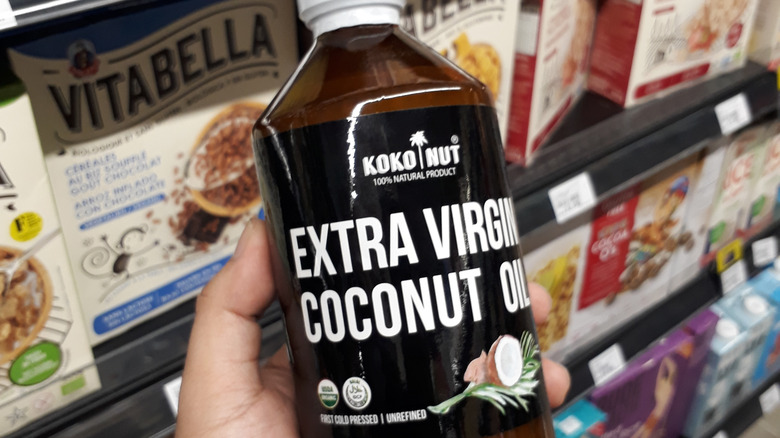Should You Avoid Eating Coconut Oil If You Have High Cholesterol?
Coconut oil is having a moment. It's used as everything from a topical cream to fight eczema to a damaged hair repair product. But is it a good fat choice for people who want to lower their cholesterol? If you're someone who struggles with too-high cholesterol levels and enjoys the taste of coconut, you probably want to know whether or not coconut oil belongs on your menu.
The main concern about eating coconut oil is that it contains plenty of saturated fat. Angel Luk, a registered dietitian, explains why that's a problem for people with inflated cholesterol. "Coconut oil is composed of 92% saturated fat, which raises low-density lipoprotein (LDL or "lousy" cholesterol levels)," she says. "People living with high cholesterol should aim to keep their saturated fat intake to less than 16 grams per day. According to the USDA Nutrient Database, 1 tablespoon of coconut oil contains 10 grams of saturated fat, making it a suboptimal choice as an everyday cooking oil choice."
The American Heart Association recommends that individuals who want to decrease their cholesterol numbers eat only 11 to 13 grams of saturated fat daily. Consequently, a single tablespoon of coconut oil could cover a day's worth of saturated fat.
Counterintuitive results on coconut oil's cholesterol-raising effects
Wait! Before tossing out your coconut oil, you should know that despite its saturated fat, it may hold some cholesterol-friendly powers.
As Angel Luk notes, coconut oil contains lauric acid. "[Lauric acid] may raise high density lipoprotein (HDL or "healthy" cholesterol levels)," she says. "However, research to date has been limited and there are no recommended doses that have been proven to improve heart health." As a result, she advises using coconut oil sparingly, if at all.
However, the research that's available shows that coconut oil may offer surprisingly desirable cholesterol level side effects. For instance, a 2020 review published in Circulation noted that although coconut oil consumption raised LDL cholesterol, it also raised high-density lipoprotein (HDL or the "good" version) cholesterol. Therefore, proponents of using coconut oil — even for people with elevated cholesterol — may have some science-based evidence on their sides.
Coconut oil holds its own in some experiments
That's not the only instance where coconut oil showed promise when investigated as a cholesterol-lowering ingredient. A 2019 study that was published in Clinical Nutrition looked at coconut oil's promise against peanut oil. The conclusion: Coconut oil didn't appear to have a negative cardiovascular effect when consumed by men following an otherwise healthy diet.
In a 2017 trial published in Evidence-Based Complementary and Alternative Medicine, participants who ingested a controlled amount of coconut oil for eight weeks experienced a rise in their HDL cholesterol. However, their LDL cholesterol stayed at roughly the same level. Another 2018 trial from BMJ Open produced similar results. Participants ingested coconut oil, butter, or olive oil. Interestingly, those who ate coconut oil saw their HDL cholesterol levels go up more than those who ate butter or olive oil. Moreover, butter seemed to bring up LDL cholesterol more than coconut oil or butter did.
Coconut oil as a treat instead of a staple
Again, whether or not science-backed, pro-coconut oil trials and studies hold up under increased scrutiny and experimentation remains to be seen. Still, they might just make you want to talk with your healthcare provider about trying coconut oil under very specific and controlled circumstances.
Not sure how to begin consuming coconut oil in a responsible and limited way? Angel Luk has answers. "If coconut oil is used, it's best consumed sparingly, in recipes used perhaps only during special occasions," she advises. "Consider drizzling a small amount over top a curry-based dish to provide an amazing tropical aroma. Also, adding a hint of coconut oil in baked desserts may elevate dishes that contain chocolate or citrus flavors."
Just be careful not to fall into the "It's fine to consume coconut oil" trend without considering all the facts, especially if you're worried about cholesterol. Yes, some studies seem to indicate that coconut oil may not be as bad as other saturated fats for those with elevated cholesterol. Nonetheless, those studies tend to include relatively modest participant numbers. Until larger trials are conducted, you (and your cardiovascular system) might be better off not going overboard or switching to coconut oil as your primary kitchen fat source.




